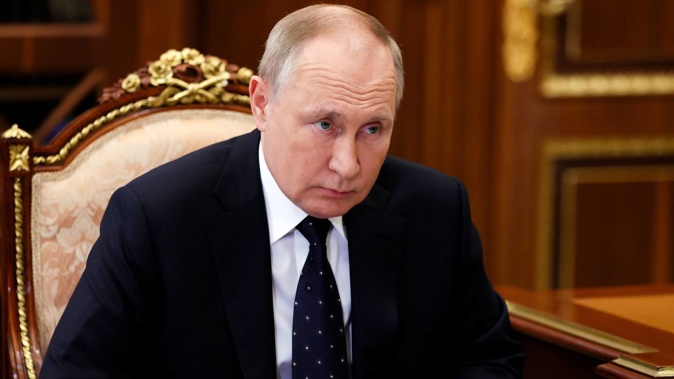
Russian soldiers being mobilised to fight in Ukraine will be ill-equipped to deal with the Ukrainian defence, according to a global security and international relations expert.
"[The mobilisation] is a sign of desperation," Otago University professor Robert Patman told the NZ Herald's The Front Page podcast.
"Mr Putin is very conscious that the situation in eastern Ukraine is quickly deteriorating."
This comes after a major recent counter-offensive, during which the Ukrainian army was able to claim back large sections of the territory occupied by the Russians.
The Russian troops have now been pushed to the east, and Ukraine has not relented in piling further pressure on the remaining occupied areas in the east.
"In the northeast of the country, they recently breached Russian defences. And what's more is that the Ukrainians have now trapped about 10,000 Russian troops in Kherson. Russia could now be set for major reverses in the near future."
Patman says the mobilisation is an attempt to address the growing problems facing the Russian army, but this strategy has a major flaw.
"You have to ask the question: How can poorly trained people who may have had some military experience five or ten years ago do what the professional part of the Russian army couldn't do? The other thing is that the Ukrainians have gathered an enormous amount of equipment in their recent counter-offensive… It's quite a tall order expecting this mobilisation to work."
These inexperienced soldiers will come up against battle-hardened Ukrainians driven by the ideal of protecting their country from this illegitimate invasion.
"The word has got out that Russian casualties in Ukraine are hitting the roof," says Patman.
- Putin's call-up fuels Russians' anger, protests and violence
- Putin grants Russian citizenship to Edward Snowden
"One of the top Ukrainian military officials gave a very tough message. He said: 'We saw off the professional Russian army - they lost 50,000 troops. Now we are going to deal with the unprofessional army.' So that phrase 'cannon fodder' comes to mind."
/cloudfront-ap-southeast-2.images.arcpublishing.com/nzme/IP462N6LIGOZDT5WMPDJTDA4IU.jpg)
Russian armed forces have faced devastating defeats in recent weeks. Photo / AP
Given the immediacy of the pressure facing the Russian army, there simply won't be enough time to train Russian citizens to fight effectively.
"There are quite reliable reports that some of those called up have only had a day's training before they're sent to the front line. If you're fighting against battle-hard Ukrainians, many of whom have been fighting Russians since 2014 and who have often outperformed their Russian counterparts, we're not talking about a match of equals."
Putin is looking increasingly cornered as this war drags on, and his political fate now hangs in the balance. This has been reflected in his recent rhetoric, which included the threat of using nuclear weapons if necessary.
"Putin has made these threatening noises from the beginning of Russia's invasion of Ukraine, and part of the intention is to intimidate Western countries in particular from supporting Ukraine's attempt to defend itself against this unprovoked invasion," says Patman.
/cloudfront-ap-southeast-2.images.arcpublishing.com/nzme/GSXNQYTK5H5CKOAHTQXUQW2UXY.jpg)
Prime Minister Jacinda Ardern has condemned Russian President Vladimir Putin's threat of nuclear war. Photo / Mark Mitchell.
"Mr Putin's speech last week was [his way] of saying to countries supporting Ukraine that they run the risk of nuclear war. Clearly, that's a false choice between a Russian victory or nuclear war. Putin is trying to influence public opinion as an authoritarian leader. He knows he's got some leverage over democracies, and so he's trying to use it."
So, should we take this threat seriously, or is it just another example of chest-thumping from an authoritarian strongman?
"I think we have to take such threats seriously, but I don't think we should go into panic mode," responds Patman.
"I don't think it's persuading Western leaders; if anything, Prime Minister Jacinda Ardern has stepped up her support for Ukraine since Mr Putin's speech, describing the Russian invasion as immoral, illegal and based on a lie. And we've also seen the United States extend another $12 billion worth of military assistance to Ukraine. So, if it was intended to intimidate, Putin's speech is probably having a reverse effect."
The big question hanging over all the war at the moment is what an authoritarian like Putin is capable of doing when cornered.
The one thing that is clear is that analysts increasingly see the possibility that Ukraine could go on to win this war - something which Patman wouldn't find surprising at all.
"Great powers do get defeated by lesser powers. The United States lost to Vietnam. The Soviet Union lost in Afghanistan. And the United States did not prevail in Iraq. So we shouldn't be surprised by the prospect of Russia losing in Ukraine."
And if that does happen, Putin knows his days will be numbered.
- The Front Page is a daily news podcast from the New Zealand Herald, available to listen to every weekday from 5am.
- You can follow the podcast at iHeartRadio, Apple Podcasts, Spotify, or wherever you get your podcasts.
Take your Radio, Podcasts and Music with you









